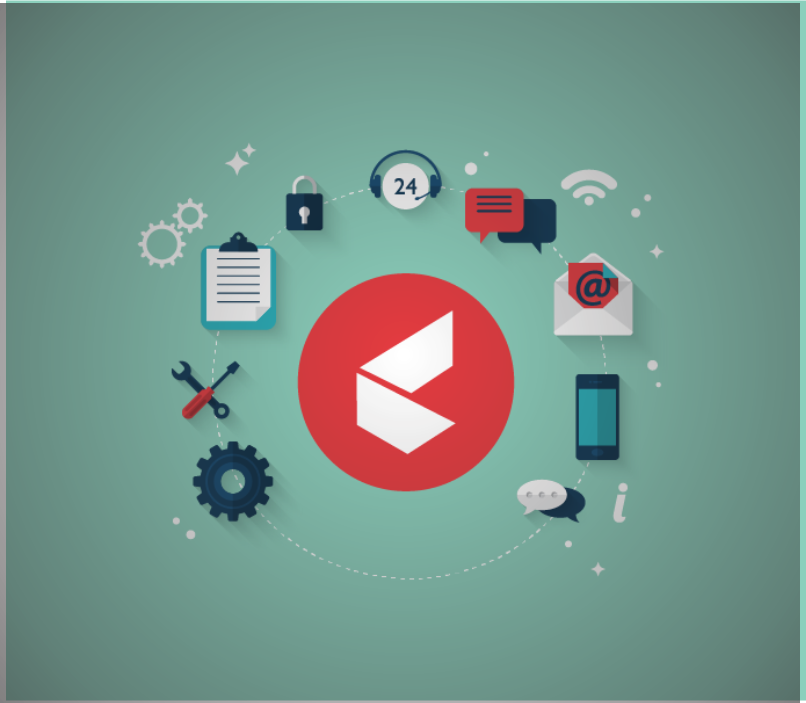
Communication is fundamental to the operation of the majority of organizations. Communication with customers to assist in resolving service-related issues and employee IT requests are both examples of situations in which the majority of organizations will eventually require a method to manage them. Help desk software is one of the most effective methods for achieving this.
Help desk software is what?
The purpose of help desk software is to manage, organize, and respond to requests pertaining to services. Different types of help centers are designed to handle internal service requests from team members as opposed to external requests from consumers.
Using a help desk platform to consolidate all of your customer support interactions into one omnichannel tool is a great way to improve the customer experience, as 75% of customers desire a consistent experience regardless of how they interact with a company (via social media, in person, by phone, etc.).
A variety of tools may be integrated into help centers, including a live messaging solution, knowledge base software, and a shared inbox. However, not all assistance centers are equipped with every instrument that was mentioned.
The Top 10 Help Desk Software
Having a basic understanding of your options is beneficial when starting your search for the ideal instrument. Presently, the top 10 help desk software with the most effective support desk software solutions are enumerated below.
1. Help Scout
Help Scout is an all-inclusive customer support platform that provides each and every instrument required to ensure an exceptional customer experience. Upon registering for Help Scout, users are granted access to an assortment of tools.
Help Scout’s collaborative inboxes feature private notes and @mentions, which can be used to request assistance from others or to provide additional context during a customer conversation. In addition, workflows automate routing and routine tasks, collision detection reduces duplicate effort, and artificial intelligence (AI) functions such as AI summarize and AI assist facilitate the support team’s work.
2. Freshdesk
Freshdesk is an adaptable help desk that is particularly advantageous for call centers and larger teams. You gain access to tools such as a knowledge base, a shared inbox, and messaging capabilities for managing support requests upon registration. Additionally, you are granted a quota of incoming minutes to manage customer phone inquiries (the precise number of minutes differs depending on the chosen plan).
Additionally, third-party integrations are provided to ensure that your support technology infrastructure remains connected. Although Freshdesk is a highly effective platform, its pricing and plans can be somewhat perplexing due to the numerous optional add-ons. Additionally, the aforementioned features are exclusive to their premium omnichannel programs.
3. Jira Service Management
Jira Service Management is frequently linked with engineering and technical teams by virtue of its association with the more widely recognized Jira project management application developed by Atlassian. Your team can manage requests, changes, incidents, problems, assets, configurations, and knowledge management all in one location with this excellent ITSM solution.
It enables the development of end-user self-service portals and includes collaboration functionalities such as a shared inbox for the management of email and chat requests. In conjunction with custom protocols, AI tools, and reporting functionalities, the platform streamlines and optimizes the process of addressing user inquiries.
4. Zendesk
Almost all customer service representatives are familiar with Zendesk. The organization develops a multi-channel support solution encompassing live messaging tools, a knowledge base, and a shared inbox. Furthermore, they provide more sophisticated AI-driven solutions for chatbots and autoresponders; however, access to these is restricted to their more expensive plans.
In addition to a plethora of automation and productivity features, you also have access to more than a thousand integrations with other tools in your support ecosystem. In all candor, Zendesk truly encompasses a vast array of communication channels and does not lack in the tasks it performs.
On the contrary, it is an exceedingly intricate product that demands substantial investments of time, effort, and resources to operationalize. This significantly increases the monthly fee, and since the majority of teams do not require access to every feature provided by Zendesk (do you really need to manage those community forums? ), it is highly probable that they could locate an alternative solution that fulfills their requirements at a lower cost.
5. Zoho Desk
Although Zoho is primarily recognized as a tool for customer relationship management, the company also develops a support solution that caters to customer interactions. Zoho Desk features many of the expected components, including a knowledge base and a shared inbox.
AI-assisted response and sophisticated automations for tasks such as conversation categorizing and categorization are also available. Additionally, Zoho Desk integrates seamlessly with other Zoho products, such as the CRM utility. However, even some fundamental functions, such as live conversation, are exclusive to their most expensive enterprise plan, which may be unaffordable for certain teams.
6. Front
The majority of support teams choose to receive consumer queries via a group email address (e.g., support@yourdomain.com) when interacting with clients. Nonetheless, certain teams would rather correspond via personal email addresses while retaining the capabilities of help desk software. Front permits precisely that.
Front enables the integration of social media, SMS, and email accounts into a unified interface. It also incorporates automation functions to reduce the amount of manual labor required and productivity features such as internal notes.
Additionally, they provide analytics, albeit exclusively on their more expensive programs. Additionally, unlike several of the alternatives on our list, Front does not offer a live chat tool for real-time support or a native knowledge base for frequently asked questions.
7. Gorgias
The primary focus of the support desk solution Gorgias is ecommerce. Standard Gorgias features include a knowledge base application, a shared inbox tool, and a live messaging tool. Its integrations with BigCommerce, Shopify, and Magento serve as the primary differentiator from the other options on the list (although Magento integration is exclusive to higher-tier plans).
You can view order details, amend orders, and issue refunds directly from your help desk using these integrations, which can save your team a substantial amount of time and effort. Nevertheless, a significant disadvantage is that each of their plans has a ticket limit, which means that your monthly expenses may fluctuate based on usage.
8. Kustomer
A novel solution is produced when help desk and project management software are combined in Kustomer. Support for Kustomer is available via email, chat, phone, and social media platforms. Regarding project management, it is possible to generate, delegate, and establish deadlines for assignments.
Additionally, you can monitor every aspect of each client and update multiple systems simultaneously, thereby conserving time and effort. Although Kustomer provides a number of noteworthy functionalities, it is notably pricey, and the pricing structure is somewhat perplexing due to the inclusion of several supplementary tools.
9. Spiceworks
Spiceworks is an additional IT support desk development solution. It facilitates the organization and management of conversations and enables the creation of a self-service portal that enables users to obtain answers and solutions independently.
Additionally, a number of manual tasks can be automated to clear up time for your IT specialists. One possible solution for an organization that offers IT services to multiple clients is to develop unique websites and user portals for each client. Moreover, Spiceworks is offered at no cost.
1o. SysAid
Help desk tickets are managed by the SysAid system, which handles internal IT requests. To reduce SLAs, they provide a variety of SLA management features, including ticket and workflow automation. A self-service portal for knowledge administration can also be developed, enabling personnel to independently manage routine tasks such as resetting their own passwords.
You may utilize one of the numerous available templates and default forms to get started immediately, or you may generate your own to better suit the requirements of your team and organization. Given the tendency for IT tools to operate in tandem, users are granted access to a multitude of third-party integrations.
SOURCE: Help Scout Blog


